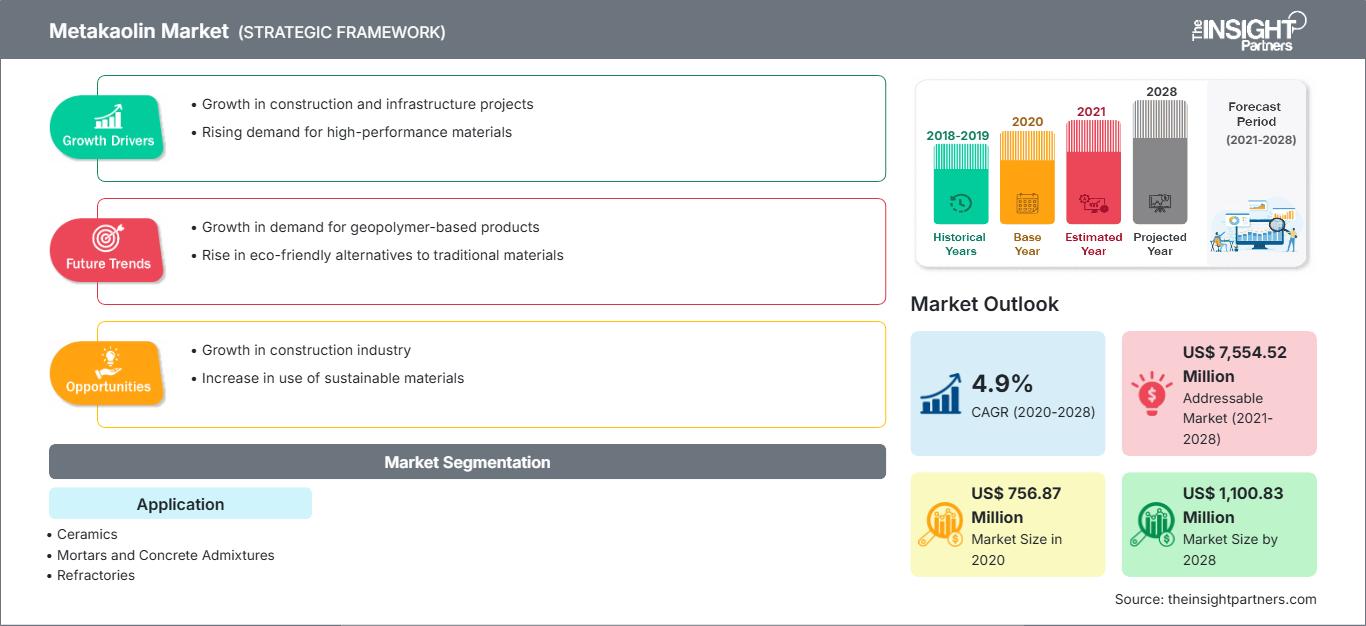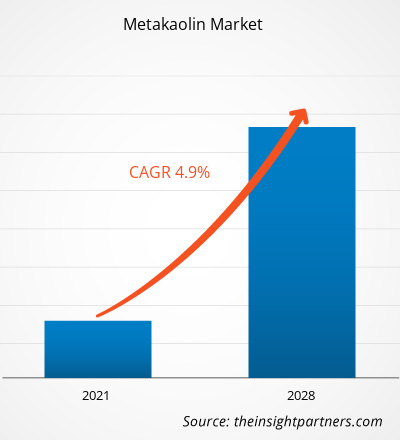Der Metakaolin-Markt wurde im Jahr 2020 auf 756,87 Millionen US-Dollar geschätzt und soll bis 2028 1.100,83 Millionen US-Dollar erreichen; von 2021 bis 2028 wird ein durchschnittliches jährliches Wachstum von 4,9 % erwartet.
Metakaolin ist eine wasserfreie, kalzinierte Form des Tonminerals Kaolinit. Es ist ein wirksames Puzzolanmaterial, das als Alternative zu Zement in Beton verwendet wird. Metakaolin wird nicht als Nebenprodukt, sondern zum Verzehr hergestellt und entsteht, wenn Kaolin und das Mineral Kaolin auf 600 bis 800 °C erhitzt werden. Die Qualität von Metakaolin kann während der Herstellung kontrolliert werden, was zu einem deutlich weniger variablen Material führt. Metakaolin wird in verschiedenen Anwendungen eingesetzt, beispielsweise in der Keramik, in Mörtel- und Betonzusatzmitteln sowie in feuerfesten Materialien.
Im Jahr 2020 hatte der asiatisch-pazifische Raum den größten Anteil am globalen Metakaolinmarkt. Europa dürfte im Prognosezeitraum jedoch die höchste durchschnittliche jährliche Wachstumsrate (CAGR) auf dem Markt verzeichnen. Die Nachfrage nach Metakaolin dürfte in der Region in den kommenden Jahren aufgrund verschiedener Faktoren steigen, wie z. B. des wachsenden Bausektors, steigender verfügbarer Einkommen, der enormen Bevölkerungsbasis und des starken Engagements der Regierung für die Entwicklung einer nachhaltigen Infrastruktur für langfristiges Wachstum. Wachsende Renovierungs- und Sanierungsaktivitäten im Wohnungsbau in der Region Asien-Pazifik kurbeln die Nachfrage nach Keramikprodukten wie Fliesen und Ziegeln an, was die Nachfrage nach Metakaolin in der Region voraussichtlich ankurbeln wird. Diese Faktoren haben auch viele internationale und globale Akteure dazu bewogen, ihre Geschäfte in der Region auszuweiten.
Passen Sie diesen Bericht Ihren Anforderungen an
Sie erhalten kostenlos Anpassungen an jedem Bericht, einschließlich Teilen dieses Berichts oder einer Analyse auf Länderebene, eines Excel-Datenpakets sowie tolle Angebote und Rabatte für Start-ups und Universitäten.
Metakaolin-Markt: Strategische Einblicke

-
Holen Sie sich die wichtigsten Markttrends aus diesem Bericht.Dieses KOSTENLOSE Beispiel umfasst Datenanalysen, die von Markttrends bis hin zu Schätzungen und Prognosen reichen.
Auswirkungen der COVID-19-Pandemie auf den Metakaolin-Markt
Die COVID-19-Pandemie hat die Betriebseffizienz des Fertigungssektors aufgrund längerer Lockdowns in verschiedenen Regionen, Beschränkungen des internationalen Handels, Schließungen von Produktionseinheiten, Reiseverboten, Lieferkettenbeschränkungen und Rohstoffknappheit erheblich beeinträchtigt. Die COVID-19-Pandemie hat sich aufgrund von Produktionsschließungen, steigenden Rohstoffpreisen, Arbeitskräftemangel, Unterbrechungen der Lieferketten und finanzieller Instabilität negativ auf den globalen Metakaolin-Markt ausgewirkt. Darüber hinaus hat die Störung der Bauindustrie aufgrund der durch den COVID-19-Ausbruch verursachten Konjunkturabschwächung das Wachstum des Metakaolin-Marktes gebremst. Metakaolin wird häufig als Zementersatz in Beton verwendet. Darüber hinaus wird es auch zur Herstellung von Keramikprodukten für die gesamte Baubranche genutzt. Ein starker Rückgang der Zahl der Wohnungsbauprojekte aufgrund der Finanzkrise während der ersten Phase der globalen Pandemie hat die Nachfrage nach Metakaolin reduziert. Allerdings gewinnen Unternehmen an Boden, da zuvor verhängte Beschränkungen in vielen Ländern gelockert werden. Auch die Einführung von COVID-19-Impfstoffen durch die Regierungen verschiedener Länder hat die Lage weiter entspannt und zu einem Anstieg der Geschäftstätigkeit weltweit geführt. Darüber hinaus planen die Regierungen verschiedener Länder den Aufbau einer modernen und technologisch fortschrittlichen Infrastruktur, um die wirtschaftlichen Auswirkungen der COVID-19-Pandemie zu mildern. So hat die chinesische Regierung beispielsweise kürzlich die Kampagne „Neue Infrastruktur“ gestartet, um die wirtschaftlichen Auswirkungen des Ausbruchs zu mildern und gleichzeitig langfristiges, nachhaltiges Wachstum zu fördern. 5G-Netze, industrielles Internet, Fernverkehr und innerstädtische Schienensysteme, Rechenzentren, künstliche Intelligenz, Höchstspannung und Ladestationen für Elektrofahrzeuge werden die Schwerpunkte der Initiativen für neue Infrastruktur bilden. Solche Initiativen tragen erheblich zum Wachstum der Bauindustrie bei und steigern somit die Nachfrage nach Metakaolin. Daher wird trotz der Auswirkungen der COVID-19-Pandemie erwartet, dass der Metakaolin-Markt in den kommenden Jahren deutlich wachsen wird.
Zunehmende Verwendung in der Bauindustrie
Metakaolin ist eine dehydroxylierte Form des Tonminerals Kaolinit. Es wird zunehmend bei der Herstellung von Keramik und als Zementersatz in Beton verwendet. Aufgrund der kleineren Partikelgröße und der größeren Oberfläche von Metakaolin reagiert es schnell und reduziert den Diffusionskoeffizienten im Vergleich zu einfachem Portlandzement. In Beton trägt Metakaolin dazu bei, die Porosität zu verringern und die Porenstruktur in den ausgehärteten Pasten zu verfeinern, was die Haltbarkeit des Betons durch verbesserte Beständigkeit gegen das Eindringen von Chloriden und kontrollierte Ausdehnung aufgrund der Alkali-Aggregat-Reaktion erhöht. Portlandzement wird bei der Betonherstellung durch 8–20 Gewichtsprozent Metakaolin ersetzt, wodurch eine Betonmischung entsteht, die Eigenschaften wie Filterwirkung, puzzolanische Reaktion und die Beschleunigung der OPC-Hydratation aufweist. Metakaolin wird in der Bauindustrie aus technischen, wirtschaftlichen und ökologischen Gründen häufig als Zusatzmaterial für Zement in Konstruktionsbeton verwendet. Es wird auch im Offshore-Bau, in Wasserrückhaltestrukturen, beim Massenbetonieren und in Kernkraftwerken eingesetzt. Die Bauindustrie wächst weltweit in rasantem Tempo. Der zunehmende Ausbau moderner Infrastruktur, steigende staatliche Investitionen und die zunehmende Zahl von Wohn- und Gewerbebautätigkeiten sind einige der Schlüsselfaktoren, die das Wachstum der Bauindustrie weltweit unterstützen. Darüber hinaus konzentrieren sich die Regierungen von Ländern wie China und Indien stark auf den Ausbau ihrer Infrastrukturkapazitäten. Daher tragen derartige staatliche Initiativen in Schwellenländern zur Schaffung neuer Infrastruktur zum Wachstum des Bausektors bei, was das Wachstum des globalen Metakaolinmarktes in den kommenden Jahren ankurbeln wird.
Anwendungseinblicke
Basierend auf der Anwendung ist der Metakaolinmarkt in Keramik, Mörtel und Betonzusatzmittel, Feuerfestmaterialien und Sonstiges unterteilt. Die Mörtel und Das Segment Betonzusatzmittel hatte 2020 den größten Marktanteil, und das Keramiksegment dürfte im Prognosezeitraum die höchste durchschnittliche jährliche Wachstumsrate (CAGR) verzeichnen. Mörtel- und Betonzusatzmittel bieten Eigenschaften wie Wasserdichtigkeit, Ausblühungskontrolle und Wasserabweisung, Luftporenbildung durch Weichmacher zur Verbesserung der Verarbeitbarkeit sowie Beschleunigung und Verzögerung der Abbindezeit. Sie werden im Mauerwerksbau eingesetzt. Metakaolin ist ein künstlicher puzzolanischen Zusatzstoff, der häufig in verschiedenen Mörtel- und Betonzusatzmitteln verwendet wird. Er wird häufig in Beton eingesetzt, um dessen Spaltzug- und Biegefestigkeit zu verbessern. Beton ist ein wichtiges Produkt im Bausektor. Metakaolin wird auch zur Erhöhung der Druck- und Biegefestigkeit eingesetzt. Außerdem verbessert es aufgrund seiner puzzolanischen Reaktivität sowohl die Frühfestigkeit als auch die Festigkeit im ausgehärteten Zustand von Beton. Metakaolin verbessert die Korrosionsbeständigkeit, Haltbarkeit und Undurchlässigkeit von Beton und ist daher als Betonzusatzmittel im Bauwesen sehr gefragt. Metakaolin stärkt Beton und verringert das Risiko von Alkali-Kieselsäure-Reaktionen. Dies macht es zu einem unglaublich effektiven Material für den Bau von Autobahnbrücken, Dämmen, Stahlbetongebäuden und allen anderen Konstruktionen, die hochleistungsfähigen, hochfesten und leichten Beton erfordern. Einige Schlüsselfaktoren wie der boomende Bausektor, die schnelle Urbanisierung und enorme Investitionen der Regierungen in die Infrastrukturentwicklung werden voraussichtlich das Wachstum des Metakaolin-Marktes für das Segment Mörtel und Betonzusatzmittel im Prognosezeitraum fördern.
Einige Akteure auf dem Metakaolin-Markt sind BASF SE; Burgess Pigment Company; Imerys SA; WR Grace & Co.; Nanoshel LLC; MS Industries II, LLC; Silica Systems Inc.; Dennert Poraver GMBH; Thiele Kaolin Company; und I-Minerals Inc. Diese Unternehmen bieten ein breites Produktportfolio für den Markt. Die Unternehmen sind in den Entwicklungsregionen präsent, was lukrative Möglichkeiten für das Wachstum des Metakaolin-Marktes bietet. Die Marktteilnehmer entwickeln qualitativ hochwertige und innovative Produkte, um die Anforderungen der Kunden zu erfüllen.
Berichts-Spotlights
- Fortschreitende Branchentrends auf dem Metakaolin-Markt helfen den Akteuren bei der Entwicklung effektiver langfristiger Strategien
- Geschäftswachstumsstrategien in entwickelten und sich entwickelnden Märkten
- Quantitative Analyse des Metakaolin-Marktes von 2019 bis 2028
- Schätzung der weltweiten Nachfrage nach Metakaolin
- Porters Fünf-Kräfte-Analyse zur Veranschaulichung der Wirksamkeit von Käufern und Lieferanten in der Branche
- Neueste Entwicklungen zum Verständnis des Wettbewerbsmarktszenarios
- Markttrends und -aussichten sowie Faktoren, die das Wachstum des Metakaolin-Marktes vorantreiben und hemmen
- Unterstützung im Entscheidungsprozess durch Hervorhebung von Marktstrategien, die das kommerzielle Interesse untermauern und zum Marktwachstum führen
- Die Größe des Metakaolin-Marktes in verschiedenen Knoten
- Detaillierter Überblick und Segmentierung des Marktes sowie der Dynamik der Metakaolin-Branche
- Größe des Metakaolin-Marktes in verschiedenen Regionen mit vielversprechenden Wachstumschancen
Metakaolin
Regionale Einblicke in den Metakaolin-MarktDie Analysten von The Insight Partners haben die regionalen Trends und Faktoren, die den Metakaolin-Markt im Prognosezeitraum beeinflussen, ausführlich erläutert. In diesem Abschnitt werden auch die Marktsegmente und die geografische Lage von Metakaolin in Nordamerika, Europa, im asiatisch-pazifischen Raum, im Nahen Osten und Afrika sowie in Süd- und Mittelamerika erörtert.
Umfang des Metakaolin-Marktberichts
| Berichtsattribut | Einzelheiten |
|---|---|
| Marktgröße in 2020 | US$ 756.87 Million |
| Marktgröße nach 2028 | US$ 1,100.83 Million |
| Globale CAGR (2020 - 2028) | 4.9% |
| Historische Daten | 2018-2019 |
| Prognosezeitraum | 2021-2028 |
| Abgedeckte Segmente |
By Anwendung
|
| Abgedeckte Regionen und Länder |
Nordamerika
|
| Marktführer und wichtige Unternehmensprofile |
|
Dichte der Metakaolin-Marktakteure: Verständnis ihrer Auswirkungen auf die Geschäftsdynamik
Der Metakaolin-Markt wächst rasant, angetrieben durch die steigende Endverbrauchernachfrage aufgrund von Faktoren wie sich entwickelnden Verbraucherpräferenzen, technologischem Fortschritt und einem stärkeren Bewusstsein für die Produktvorteile. Mit steigender Nachfrage erweitern Unternehmen ihr Angebot, entwickeln Innovationen, um den Verbraucherbedürfnissen gerecht zu werden, und nutzen neue Trends, was das Marktwachstum weiter ankurbelt.

- Holen Sie sich die Metakaolin-Markt Übersicht der wichtigsten Akteure
Metakaolin-Markt – nach Anwendung
- Keramik
- Mörtel & Betonzusatzmittel
- Feuerfestmaterialien
- Sonstige
Firmenprofile
- BASF SE
- Burgess Pigment Company
- Imerys SA
- WR Grace & Co.
- Nanoshel LLC
- MS Industries II, LLC
- Silica Systems Inc.
- Dennert Poraver GMBH
- Thiele Kaolin Company
- I-Minerals Inc.
- Historische Analyse (2 Jahre), Basisjahr, Prognose (7 Jahre) mit CAGR
- PEST- und SWOT-Analyse
- Marktgröße Wert/Volumen – Global, Regional, Land
- Branchen- und Wettbewerbslandschaft
- Excel-Datensatz
Aktuelle Berichte
Erfahrungsberichte
Grund zum Kauf
- Fundierte Entscheidungsfindung
- Marktdynamik verstehen
- Wettbewerbsanalyse
- Kundeneinblicke
- Marktprognosen
- Risikominimierung
- Strategische Planung
- Investitionsbegründung
- Identifizierung neuer Märkte
- Verbesserung von Marketingstrategien
- Steigerung der Betriebseffizienz
- Anpassung an regulatorische Trends






















 Kostenlose Probe anfordern für - Metakaolin-Markt
Kostenlose Probe anfordern für - Metakaolin-Markt